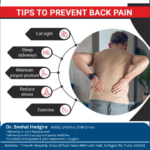
Are you familiar with the old saying, “You are what you eat”? Well, when it comes to your orthopedic health, it might be more accurate to say, “Your joints are what you weigh.” In this blog, we’ll explore the vital connection between weight management and the health of your bones and joints.
Understanding the Load-Bearing Reality
Our bodies are intricate systems of bones, joints, and muscles that work together to support us in all our activities. But just like a bridge or a building, they have limits to the amount of weight they can bear comfortably.
Extra weight puts added stress on these structures, which can lead to a host of orthopedic issues. The more you weigh, the harder your joints have to work, and this can result in:
- Osteoarthritis: Excess weight places strain on weight-bearing joints like the knees and hips, increasing the risk of osteoarthritis. This condition involves the breakdown of cartilage, leading to pain, stiffness, and reduced mobility.
- Back Pain: Carrying excess weight can lead to chronic back pain, as the spine must support the added load. It can also exacerbate conditions like herniated discs.
- Joint Inflammation: Fat tissue is metabolically active and can produce chemicals that promote inflammation. Chronic inflammation can harm joint tissues.
- Joint Injuries: Heavier individuals are more susceptible to injuries like sprains and fractures, as joints and bones can only handle so much strain.
The Good News: Weight Management Can Help
The good news is that even modest weight loss can have a significant positive impact on your orthopedic health. Shedding just a few pounds can reduce the strain on your joints, alleviate pain, and prevent further damage. Here’s how you can get started:
- Healthy Eating: Focus on a balanced diet with lots of fruits, vegetables, and lean proteins. Portion control is key.
- Regular Exercise: Incorporate low-impact exercises like swimming or cycling, which are gentle on your joints. Gradual weight loss through exercise is beneficial.
- Consult with a Professional: Consider consulting with a nutritionist or orthopedic specialist for personalized guidance.
- Stay Committed: Remember that weight loss is a journey, not a sprint. Stay consistent and patient.
In summary, your orthopedic health is closely linked to your weight. Maintaining a healthy weight can reduce the risk of orthopedic problems and help manage existing conditions. By taking steps to manage your weight, you can safeguard the health of your bones and joints, allowing them to support you for years to come.










